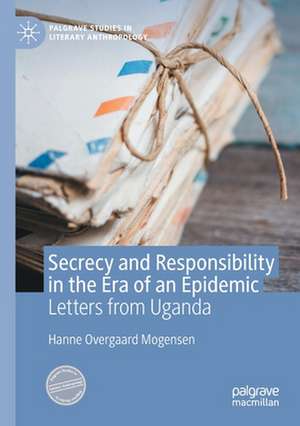Secrecy and Responsibility in the Era of an Epidemic: Letters from Uganda: Palgrave Studies in Literary Anthropology
Autor Hanne Overgaard Mogensenen Limba Engleză Paperback – 31 iul 2021
| Toate formatele și edițiile | Preț | Express |
|---|---|---|
| Paperback (1) | 581.98 lei 6-8 săpt. | |
| Springer International Publishing – 31 iul 2021 | 581.98 lei 6-8 săpt. | |
| Hardback (1) | 586.23 lei 6-8 săpt. | |
| Springer International Publishing – 30 iul 2020 | 586.23 lei 6-8 săpt. |
Din seria Palgrave Studies in Literary Anthropology
-
 Preț: 144.72 lei
Preț: 144.72 lei -
 Preț: 153.17 lei
Preț: 153.17 lei -
 Preț: 192.24 lei
Preț: 192.24 lei -
 Preț: 281.14 lei
Preț: 281.14 lei -
 Preț: 248.82 lei
Preț: 248.82 lei - 15%
 Preț: 582.30 lei
Preț: 582.30 lei - 15%
 Preț: 585.26 lei
Preț: 585.26 lei -
 Preț: 198.39 lei
Preț: 198.39 lei - 15%
 Preț: 578.70 lei
Preț: 578.70 lei - 15%
 Preț: 582.30 lei
Preț: 582.30 lei - 15%
 Preț: 635.47 lei
Preț: 635.47 lei -
 Preț: 211.47 lei
Preț: 211.47 lei - 18%
 Preț: 779.39 lei
Preț: 779.39 lei - 18%
 Preț: 887.24 lei
Preț: 887.24 lei - 18%
 Preț: 776.09 lei
Preț: 776.09 lei - 18%
 Preț: 723.69 lei
Preț: 723.69 lei - 18%
 Preț: 719.28 lei
Preț: 719.28 lei - 18%
 Preț: 775.96 lei
Preț: 775.96 lei -
 Preț: 351.49 lei
Preț: 351.49 lei - 18%
 Preț: 775.78 lei
Preț: 775.78 lei - 18%
 Preț: 892.90 lei
Preț: 892.90 lei -
 Preț: 313.39 lei
Preț: 313.39 lei
Preț: 581.98 lei
Preț vechi: 684.68 lei
-15% Nou
Puncte Express: 873
Preț estimativ în valută:
111.36€ • 116.58$ • 92.14£
111.36€ • 116.58$ • 92.14£
Carte tipărită la comandă
Livrare economică 05-19 aprilie
Preluare comenzi: 021 569.72.76
Specificații
ISBN-13: 9783030475253
ISBN-10: 3030475255
Pagini: 246
Ilustrații: XXVIII, 246 p. 2 illus., 1 illus. in color.
Dimensiuni: 148 x 210 mm
Greutate: 0.36 kg
Ediția:1st ed. 2020
Editura: Springer International Publishing
Colecția Palgrave Macmillan
Seria Palgrave Studies in Literary Anthropology
Locul publicării:Cham, Switzerland
ISBN-10: 3030475255
Pagini: 246
Ilustrații: XXVIII, 246 p. 2 illus., 1 illus. in color.
Dimensiuni: 148 x 210 mm
Greutate: 0.36 kg
Ediția:1st ed. 2020
Editura: Springer International Publishing
Colecția Palgrave Macmillan
Seria Palgrave Studies in Literary Anthropology
Locul publicării:Cham, Switzerland
Cuprins
Preface.- Chapter 1: The Missing Letters.- Chapter 2: Girls with Fast Legs.- Chapter 3: Women on the Move.- Chapter 4: Intersecting Trajectories.- Chapter 5: Questions of Belonging.- Chapter 6: Stories that Alter Life.- Chapter 7: Dying Poor.- Chapter 8: Feeling Stuck.- Chapter 9: Closeness and Distance.- Chapter 10: Knowing what to Hide.- Chapter 11: The Order of Secrecy.- Chapter 12: Shifting Secrets.- Chapter 13: Whose Responsibility – and what Happened to the Letters?.- Chapter 14: Moving on.
Notă biografică
Hanne Overgaard Mogensen is Associate Professor in the Department of Anthropology, University of Copenhagen. She has published broadly on international health, poverty and access to health care in Africa, as well as on the moral world of anthropologists both inside and outside of academia.
Textul de pe ultima copertă
‘This is a beautiful, sad, hopeful, thought-provoking book that reads like a novel and is one of the best texts I know on the intricacies of doing close-in ethnographic fieldwork. It is rare to find such rich ethnography together with such a superb account of how it was assembled. It sensitively considers ethical dilemmas of doing fieldwork with people who are poor, sick and concerned with maintaining control over knowledge about their lives.'
—Susan Reynolds Whyte, Professor of Anthropology, University of Copenhagen, Denmark
A narrative ethnography about a Ugandan woman and her relatives, this novelistic, fine-grained volume shows how global questions of responsibility and inequity travel in family networks and confront people with decisions about life and death. It is a story of existence under extremely challenging conditions, about belonging and marginalization, about the opacity and ambiguity of social relations, and about growing up in a country haunted by violence and civil war only to be later lifted by optimism and devastated anew by the AIDS epidemic. The story draws on long-term fieldwork and letters from the woman who takes centre stage in the story, while at once providing unique and privileged insight into the ethical challenges of a research method that demands personal involvement that is ultimately withdrawn for scholarly analysis.
—Susan Reynolds Whyte, Professor of Anthropology, University of Copenhagen, Denmark
A narrative ethnography about a Ugandan woman and her relatives, this novelistic, fine-grained volume shows how global questions of responsibility and inequity travel in family networks and confront people with decisions about life and death. It is a story of existence under extremely challenging conditions, about belonging and marginalization, about the opacity and ambiguity of social relations, and about growing up in a country haunted by violence and civil war only to be later lifted by optimism and devastated anew by the AIDS epidemic. The story draws on long-term fieldwork and letters from the woman who takes centre stage in the story, while at once providing unique and privileged insight into the ethical challenges of a research method that demands personal involvement that is ultimately withdrawn for scholarly analysis.
Caracteristici
A narrative ethnography combining fieldwork, letters of interlocutors, and auto-ethnography Offers a fine-grained ethnography to explore how war, political turmoil, development aid, AIDS, and antiretroviral treatments have changed life in Uganda since the 1970s Probes the ethical questions raised by ethnographic research and the potential violence of doing anthropology
